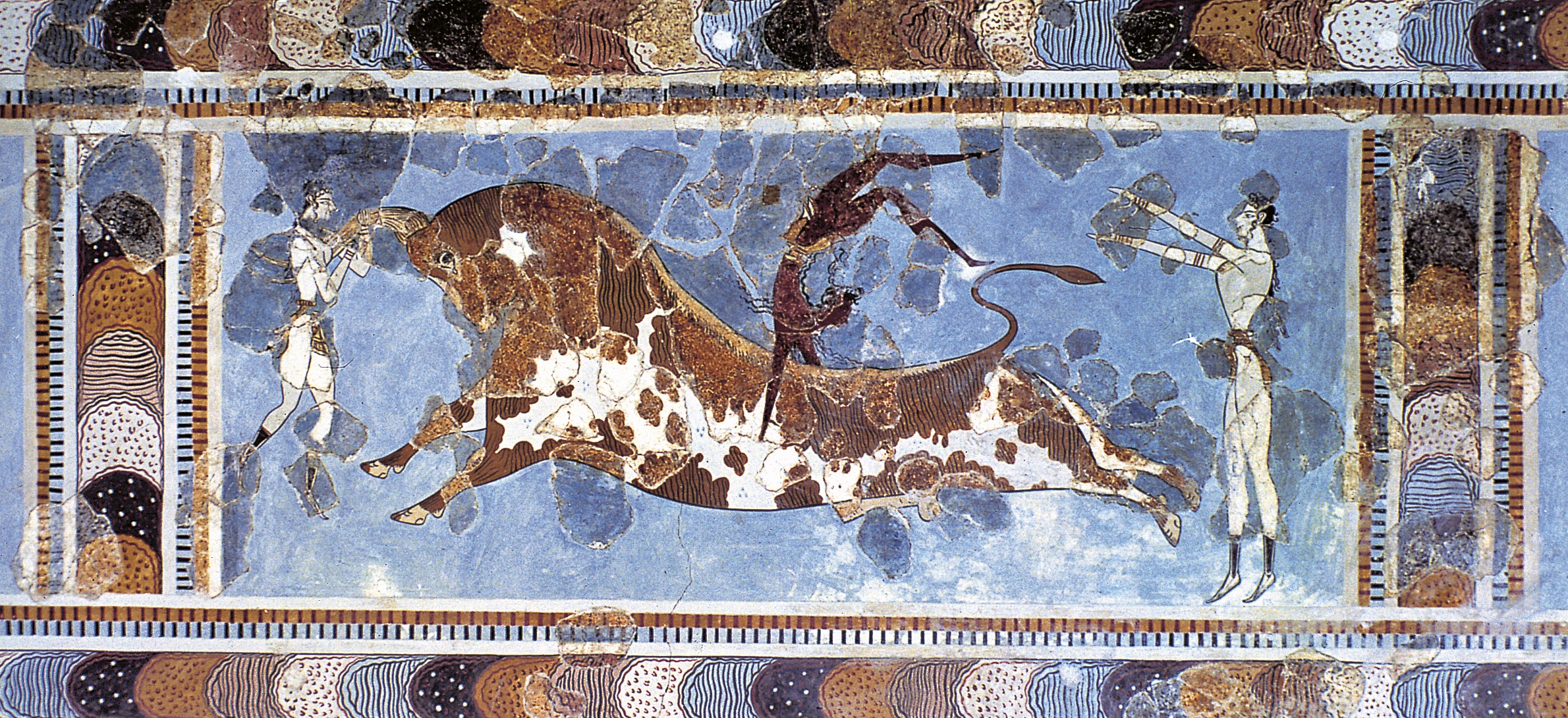
The myth of Achilles is what Homer sings in his Iliad and the poem itself seems to be built on the figure of the hero right from the first verse:Sing to me, o Diva, of Pelide Achilles the deadly wrath …
It also seems that the Iliad was born from a poem that could be sung in just one night and was entitled The Wrath of Achilles, a short story of the quarrel between Agamemnon and Achilles over a Trojan princess.
But the story has a much broader scope even if it appears that the singer proceeded by weaving the plot on the warp of the Pelide myth because the poem unfolds in the sequence of his deeds, of his being or not being there and perhaps the only other hero who is capable of attracting attention is the one who has the brilliant idea, that son of Sisyphus who will become the hero par excellence of Western culture, Odysseus. It is therefore Homer who gave an immortal thickness to the myth of Achilles although Greek mythology reserved him a secondary role as a demigod. In fact, Hesiod presents Achilles only in the final part of his Theogony, when he tells of the Zeus lineage, as born from the union of a deity with a mortal and then mentions the hero as the son of the Nereid Thetis and Peleus king of the Myrmidons.
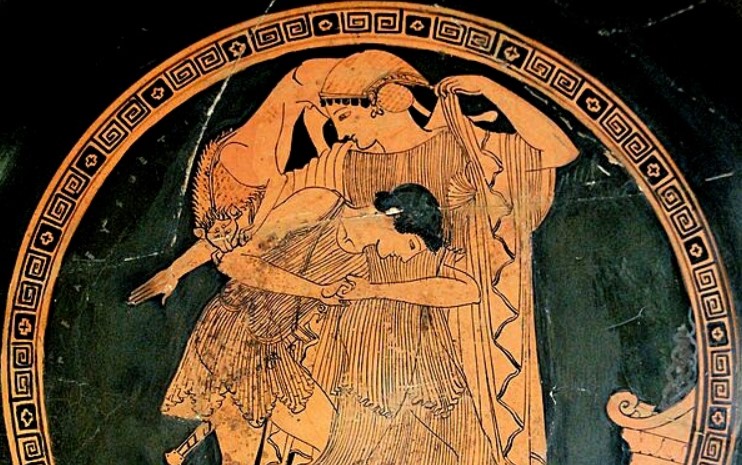
Thetis and Peleus, 5th century BC Attic vase.
Yet the wedding of Peleus, favored by the gods, took place because no god wanted to risk joining the beautiful Thetis after an oracle had predicted that his son would be greater than his father. Zeus, though fearing the prophecy, had advanced his love proposals to the nereid who had refused them, not wanting to do an injury to her godmother Hera; Zeus then decided to punish her and condemned her don't marry an immortal. Indignant Thetis went to a beach on an island in Thessaly where Peleus, helped by Hera and the centaur Chiron, was the only mortal who managed to grab and hold her despite her changing appearance to free herself from her grip, and finally surrendered to the tenacity of strong Peleo and consented to the wedding.
Many poets and artists have longed for this wedding and Catullus in his Song 34 recounts that:
"… when the gods had stretched out their limbs on the seats as white as snow, the tables were sumptuously laid out with the most diverse foods; meanwhile the Fates, shaking their bodies with a faint moan, began to foretell true songs …"
The Fates of the Romans for the Greeks had the name Moire and were Klotho, she who spins, Lachesis, she who fixes the fate, Atropos, the inexorable, they predicted to Peleus and Thetis a happy marriage and the birth of a son who would become the most heroic of all heroes.
All the gods had been invited to the wedding except Eris, Goddess of discord, who could not be present on a day of happiness. Annoyed Eris showed up anyway with a golden apple that was supposed to go to the most beautiful of the goddesses. Then the dispute arose between Hera, Aphrodite and Athena and to resolve it the judgment of Paris was requested; Aphrodite, to win, promised to marry the most beautiful woman, Helena, the wife of Menelaus king of Sparta. Once the victory was obtained, Aphrodite helped Paris to kidnap Helena thus causing a clash between the Achaeans, an ethnic group to which the atreid Menelaus belonged, and the Dardanids to which Paris belonged, a clash which would have ended twenty years later under the walls of Troy and which would have been fatal to the son of Thetis and Peleus.
It was in the palace of Phtia, a city in Thessaly, that a child was born who was given the name of Achilles; a soothsayer priest of Apollo, Calchas, predicted that only with the help of Achilles the city of Troy, against which the Greeks had already decided to send an army, would fall and also that the fate of the blond son of Teti would depend on his choice between covering himself in glory and dying young on the battlefield or living a long life but leading a dark existence. For her son Thetis wanted immortality and then immersed him three times in the waters of the Styx to make him invulnerable but since she did so by holding him by the heel, this was the only part of his body to remain vulnerable.
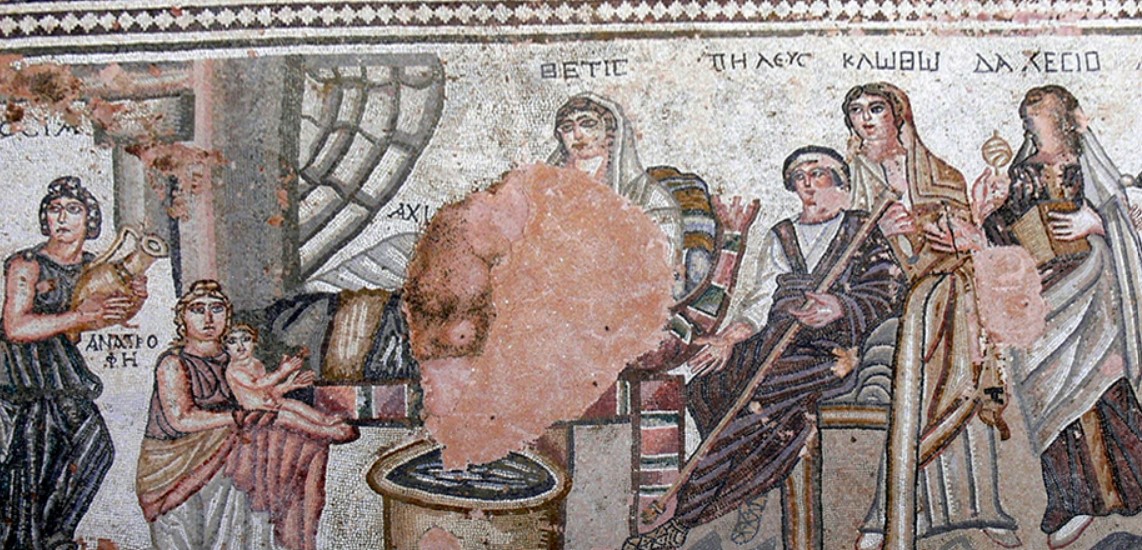
Mosaic of the first bath of Achilles, 4th century CE - House of Perseus in Nea Paphos, Cyprus.
There is also another version of the myth according to which Teti resorted to purification rituals to make her son immortal; every night, secretly from Peleus, he lowered him into the fire to destroy what was mortal in him as inherited from his father, A digression from the story is the one reported by Ptolemy Hephaestion, according to which Thetis had a total of seven children by Peleus but the first six had died in an attempt to make them immortal because she had subjected them to magical rites in which she exposed their bodies to fire. According to some, the epilogue would have been their ascent to Olympus but there is no mention of these immortal brothers of Achilles, according to others they would all be dead.
On the seventh child Thetis attempted the magical rites again and if at night the little one had to fight with fire, during the day the mother anointed him with ambrosia. Peleus, however, began to notice that something was happening at night and remained awake, he saw the bride immerse the child in the fire and immediately intervened to prevent Thetis from completing her plan. He took care of the child away from her and then Thetis left Peleus and returned to live with the Nereid sisters. When she left Peleus' house to go back to the sea, Thetis decided to name her son Achilles because he hadn't put his lips on her breasts.
(Robert Graves),
According to Apollodorus it was Peleus who decided to entrust the child to the centaur Chiron, according to others it was Thetis herself when she realized that she had caused problems for the child.
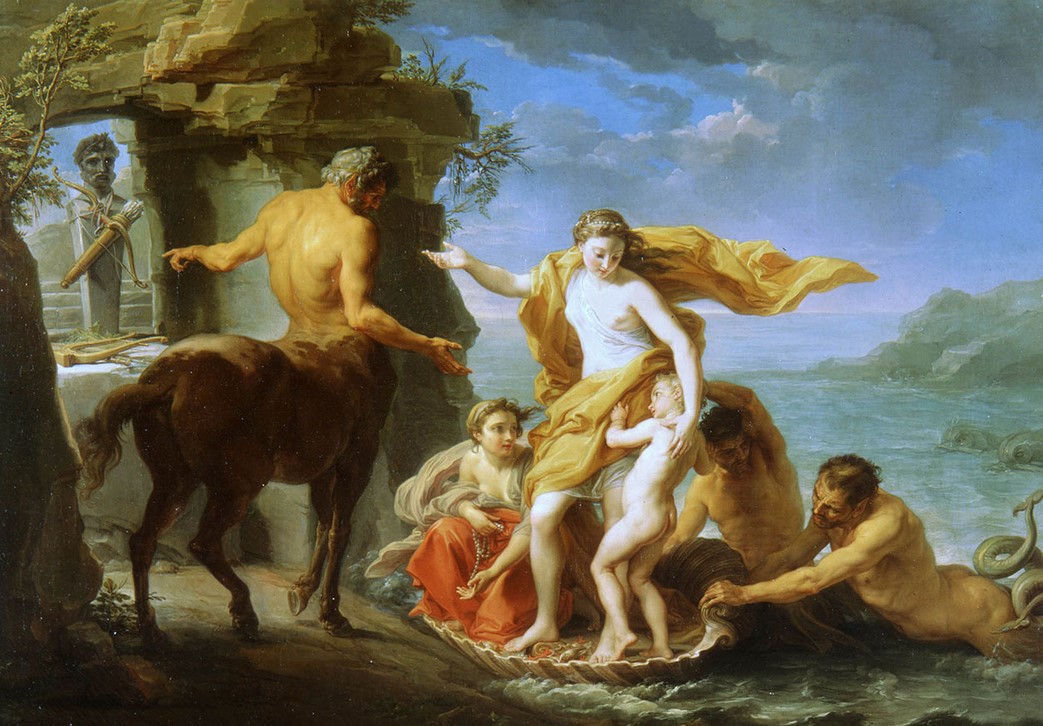
Pompeo Batoni. Thetis entrusts Achilles to Chiron, 1761 – Pilotta complex, Parma IT.
Peleus knew that his son was special and so he thought of entrusting his education to the wisest master, the one who had also educated Jason, Theseus, Asclepius and others; with him the little Liguros - this was the name of the son of Peleus and Thetis at that time - would have learned the sciences and the arts, including that of war. When Chiron saw the child he realized that he was missing a foot bone that had been burned during the magical rites that Thetis performed to make him immortal.
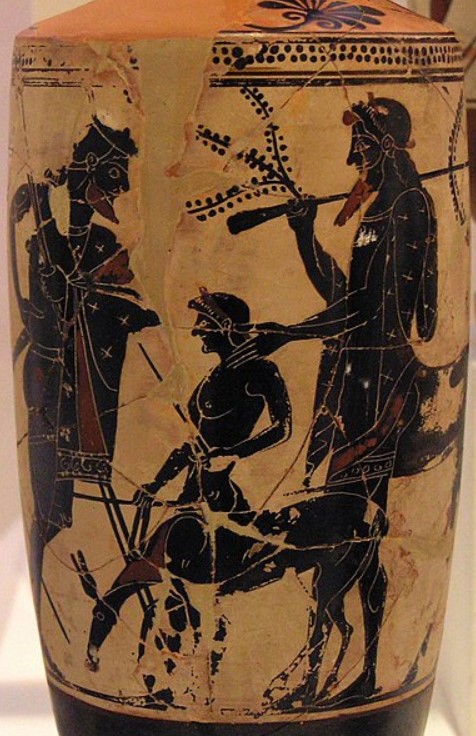
Peleus entrusts Achilles to Chiron. Black-figure lekythos from Eretria, 500 BC. - National Archaeological Museum of Athens G.
In addition to having wisdom and knowledge of the arts, the centaur knew the secrets of medicine and decided to replace the Achilles bone that had been burned during the rites attempted by Thetis. Chiron went to where the giant Damysos famous for his speed was buried, took the foot bone from the lifeless body and then transplanted it to Achilles and this would be the reason why the warrior prince was so strong in running that he was also known with the appellation of sweet-footed.
Chiron also took care to instill in the young son of Peleus physical strength, courage and agility by nourishing him with essences of animals emblematic of these virtues: lion and wild boar marrow, bear's grease but also bee honey and deer marrow.
Homer, for his part, when he described in the Iliad the paideia imparted to Achilles departed from the traditional versions and made it more similar to that of a young aristocrat of archaic Greek societies. Achilles' education had to have all the elements that allowed a predestined child to become the hero par excellence, a complete training path that was also a life model.
Up to the age of seven he lived in his father's house guarded by the nurses but after that his time came to begin forming his body in the arts of war. For this Peleus could count on two loyalists, the centaur Chiron and the prince Phoenix.
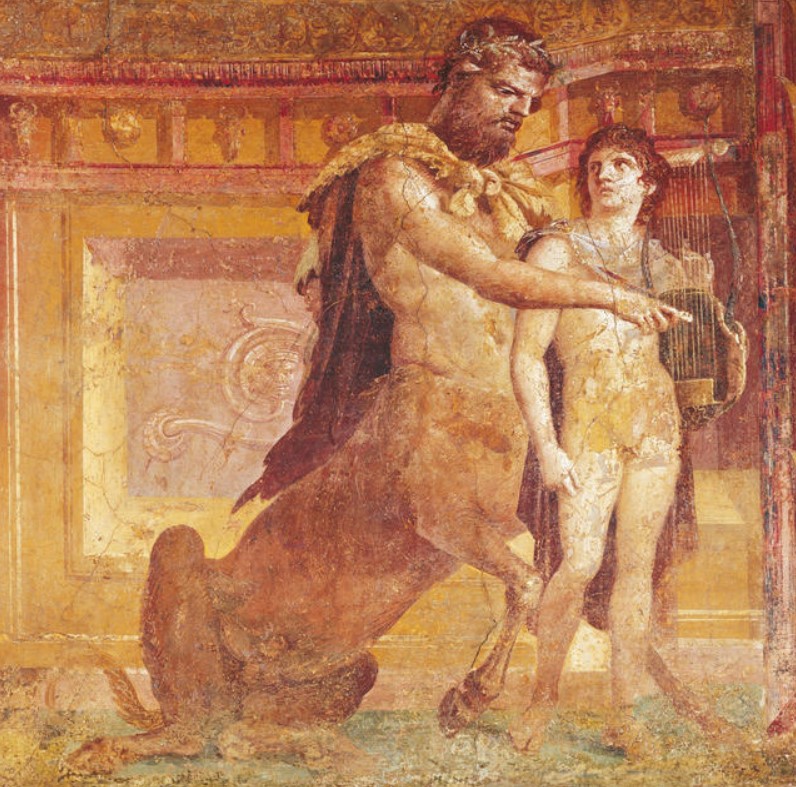
The centaur Chiron teaches music to the young Achilles, fresco from the Augusteum of Herculaneum - National Archaeological Museum of Naples IT.
Latin poet Ovid , in Book V of the Fasti, also wanted to tell the myth choosing as emblem of the relationship between master and pupil the episode in which the wise Chiron, now advanced in years, lets one of his poisoned arrows slip in the left foot; it seems a trivial mistake by Ovid to forget the very nature of Chiron equipped with hooves and not with feet even if, more probably, the poet considers the centaur in the most archaic form when the lower part of his body, the front one, still had a human form and then feet.
Chiron was immortal but the poison of his arrows caused a lot of pain and even the medicines prepared with herbs did not soothe the pain. Achilles bent in pain and fear for his master cried hot tears and holding out his hands begged him not to abandon him but Chiron asked Zeus to put an end to his agony and the king of the gods allowed him to die. In this way, according to Ovid, the long period of learning of Achilles ended and he returned to the house of his father Peleus.
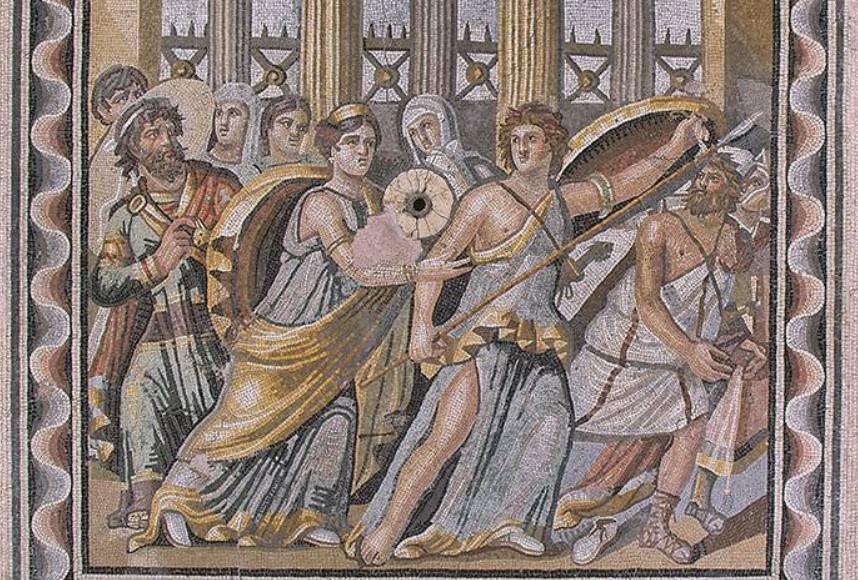
Odysseus discovers Achilles at the court of Lycomedes, king of Scyros, floor mosaic from the house of Poseidon, 2nd century AD. - Zeugma TUR
Achilles was still very young when Agamemnon began to form the Achaean coalition that was to wage war against Troy and to look for allies he sent his emissaries Nestor and Odysseus to Peleus' palace. The boy was thrilled by their stories and made his decision: he wanted to participate in the expedition. But his mother Thetis, remembering the prophecies, tried to save the life of that splendid son and then decided to make him untraceable: she sent him to the court of King Lycomedes in Sciro, where he would have lived disguised as a woman as one of the handmaids of the king's daughters. Achilles also changed his name, it became Pyrrha or the redhead who remembered the color of his fiery blond hair.
There are different interpretations of the time Achilles spent at Lycomedes' court; some scholars maintain that Thetis took him to Scyros when he was nine years old and therefore Achilles would have remained there for a fairly long time until the trap set for him by Odysseus led him to reveal himself; Other scholars believe that Achilles' stay in Sciro lasted nine years.
In the Achilleis the period passed by Achilles in Sciro is full of many other details such as the story of the perplexity of King Lycomedes when he saw the so beautiful and strong body of Pyrrha and then Thetis told him that the young woman was the daughter of a queen of the people of the Amazons who wanted a more "feminine" education for her and gentle manners in view of a wedding. But if the king had doubts about that young woman too "strong" to be a girl, Achilles in turn did not want to spend his life only among women but his reluctance to that disguise ceased when he saw one of the king's daughters and he was so attracted that he accepted what his mother wanted for him. Disguised as a woman he could have lived next to that love of his. And then it happened that Pyrrha aroused the attentions of Deidamia, the beautiful daughter of the king, to whom the young man also felt attracted and a short time passed when the flame of passion was lit between the two.
First part: rev.0 by M.L. ©ALL RIGHTS RESERVED (Ed 1.0 - 06/04/2023)
